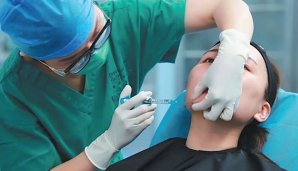Skin discoloration from acne is a common condition that occurs when acne blemishes leave behind dark or red spots on the skin. This discoloration can be a result of post-inflammatory hyperpigmentation (PIH), which is the body's response to inflammation. PIH causes the skin to produce more melanin, which is responsible for giving the skin its color. There are several ways to treat skin discoloration from acne, including:
Topical treatments
Over-the-counter creams and serums containing ingredients like vitamin C, niacinamide, and hydroquinone can help to fade discoloration over time. Topical creams containing ingredients such as hydroquinone, kojic acid, and azelaic acid that have been shown to help reduce skin discoloration caused by acne. These ingredients work by inhibiting the production of melanin in the skin, which can cause dark spots or patches.
Microdermabrasion
Microabrasion is a skin resurfacing procedure that uses a mechanical device to remove the top layer of the skin, which can help improve the appearance of fine lines, acne scars, and hyperpigmentation. It may be helpful in removing skin discoloration due to acne, particularly if the discoloration is mild to moderate. However, it is important to note that the effectiveness of the treatment may depend on various factors such as the severity of the discoloration, the type of skin, and the underlying cause of the discoloration.
In some cases, more advanced treatments such as chemical peels or laser therapy may be necessary to effectively address skin discoloration caused by acne.
Chemical peels
Chemical peels can be helpful in addressing skin discoloration from acne. Chemical peels are a type of skin treatment that involves the application of a chemical solution to the skin, which causes the top layer of the skin to peel off. This process can help to remove dead skin cells and stimulate the growth of new, healthier skin.
Chemical peels can help to reduce the appearance of acne scars and hyperpigmentation caused by acne. They work by exfoliating the skin and promoting the production of collagen, which can help to reduce the appearance of scars and improve skin texture.
However, it's important to note that chemical peels are not a one-time solution for acne scars and discoloration. Multiple treatments may be needed to achieve the desired results, and it's important to follow a proper skincare routine to maintain the effects of the treatment.
It's also important to consult with a dermatologist or skincare professional before undergoing a chemical peel, as they can help determine the appropriate strength and type of peel for your skin type and condition.
Laser therapy
Laser therapy can be an effective solution for removing skin discoloration caused by acne. The type of laser used will depend on the severity of the discoloration and the individual's skin type. One common type of laser used for treating acne discoloration is the pulsed dye laser, which targets the redness and pigmentation caused by acne. Another type of laser commonly used is the fractional laser, which works by resurfacing the skin and promoting the growth of new, healthy skin cells.
Remember, laser therapy may not completely remove all discoloration, and multiple treatments may be necessary to achieve desired results. Additionally, laser therapy may not be suitable for everyone, especially those with darker skin tones or certain medical conditions. It is best to consult with a dermatologist or qualified healthcare professional to determine if laser therapy is the right treatment option for you.
It's important to note that the treatments mentioned above may take time to show results and that consistency is key. It's also important to talk to a dermatologist before starting any new treatment to ensure that it's safe and effective for your skin type and condition.
Tips to prevent skin discoloration from acne
Acne can leave behind marks and discoloration on the skin, but there are several ways to prevent or reduce the appearance of these marks:
- Avoid picking at or squeezing acne lesions as this can lead to further inflammation and increase the risk of scarring.
- Use sunscreen regularly to prevent UV damage, which can worsen the appearance of discoloration.
- Consider using products containing ingredients like vitamin C, niacinamide, and retinoids, which can help improve skin tone and reduce hyperpigmentation.
- Maintain a consistent skincare routine that includes gentle cleansing, exfoliation, and moisturizing.
- Avoid using harsh scrubs or abrasive tools that can damage the skin and worsen discoloration.
- Avoid using products that contain fragrances, alcohol, or other potentially irritating ingredients that can cause inflammation and worsen discoloration.
If necessary, consult with a dermatologist who can recommend professional treatments such as chemical peels, microdermabrasion, or laser therapy to help reduce the appearance of discoloration.





